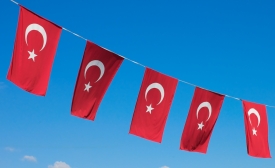eurasia
The United States is applying different standards in its public criticism of the human rights record of authoritarian states of the former Soviet Union (FSU), according to a new report released here Monday by the Open Society Institute (OSI). The key variable, according to “Human Rights and the Failings of U.S. Public Diplomacy in Eurasia”, appears to be the perceived strategic importance of the specific country.
The chairman of the Azerbaijan Youth Organization of Russia and the founder of organization IDEA Leyla Aliyeva published in the "Rossiyskaya Qazeta" narrates about Azerbaijan's effective cultural policy abroad and positive results of the public diplomacy realized by Azerbaijan in Russia.
In early August, Nizhny Novgorod hosted an international conference on the future of the Eurasian Union, "Public Diplomacy and Eurasian Rapprochement: Supporters and Skeptics". Experts from Russia, Belarus, Kazakhstan, Ukraine, Azerbaijan, Kyrgyzstan, Tajikistan and Moldova discussed the current problems of integration in the former Soviet Union. The organizer of the event was the Gorchakov Public Diplomacy Fund.
Turkey’s public diplomacy has gained increasing prominence in the news over the past month, even in the weeks prior to the earthquake that hit Eastern Turkey. Changes in the political landscape have resulted in significant changes to Turkey’s international standing in the world. The theme that dominated news from Turkey’s Today’s Zaman throughout the month of October was this Muslim-majority nation with a secular democratic government and a vibrant Islamic culture.
The recent developments the world has been witnessing leave no room for doubt that Turkey is an exceptional and indispensable player on the regional and global stage. Turkey, with its vital geopolitical position, cultural and historical wealth, economic potential, secular democracy and political influence and efficiency, is among a few countries that can play such a critical role. In this global arena, one of the most important keys to Turkey’s success has been the country’s new foreign policy and public diplomacy strategies.
The meeting is a symbol of Japan’s increasing involvement in the Eurasian region, which has occurred through various means such as trade, defence initiatives and implementations of soft power.

Sherine B. Walton, Editor-in-Chief
Naomi Leight, Managing Editor
Tracy Bloom, Associate Editor
Sarah Myers, Associate Editor







